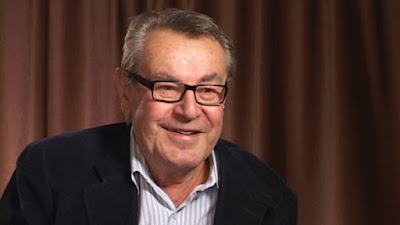Sunday, April 15, 2018
MILOS FORMAN (1932 - 2018)
Miloš Forman, the two-time Oscar winning director for "One Flew Over The Cuckoo's Nest" and "Amadeus", has sadly passed away on April 13th at the age of eighty-six after a brief illness. While he came of age during the communist regime in Czechoslovakia, Forman rebelled against these principles, taking on anti-establishment sensibilities and embraced American themes in his film making. He didn't make that many features during his over fifty years behind the camera but still managed to make an important impact in cinema with thoughtful work that challenged and provoked.
He was born Jan Tomáš Forman, the youngest of three boys to Anna and Rudolf Forman in Čáslav, Czechoslovakia. During the Nazi occupation in that country, both of his parents died in concentration camps although they were actually Protestant yet were arrested for their activities. Forman later learned that Rudolf Forman was not his actual father and discovered that his biological father was a Jewish architect, Otto Kohn, who managed to survive the Holocaust.
Forman went on to study screenwriting at the Academy of Performing Arts in Prague. He got involved in all aspects of film making in the small Czech film community as an actor and writer before directing a few short films. After his first feature "Black Peter" in 1964, his next two films, "The Loves of a Blonde" (1965) and "The Firemen's Ball" (1967) brought Foreman international acclaim and Best Foreign Language Film Oscar nominations for both features.
This brought him to Hollywood's attention and he made his first U.S. film, "Taking Off", a comedy that won the Grand Prix at the 1971 Cannes Film Festival but was a major box-office failure, leading to Foreman having difficulty in finding new work. But producers, Michael Douglas and Saul Zaentz decided to take a chance with him to direct their adaptation of Ken Kesey's novel, "One Flew Over The Cuckoo's Nest". The film was a critical and commercial hit and became the second film to win the five top categories at the 1975 Academy Awards; Best Director, Best Actor (Jack Nicholson), Best Actress (Louise Fletcher), Best Adapted Screenplay (Lawrence Hauben & Bo Goldman) and Best Picture.
Foreman followed this up with the long-planned film version of the rock musical, "Hair" (1979) and the historical drama, "Ragtime" (1981) which neither found a wide audience. "Amadeus", based on the stage play by Peter Shaffer, was about the life of the prolific and influential composer, Wolfgang Amadeus Mozart (Tom Hulce) and the jealous rivalry against him by the Italian composer, Antonio Salieri (F. Murray Abraham). This drama won eight Oscars in 1984 including Best Actor for Abraham, Best Director and Best Picture.
His next films were "Valmont" (1989), another version of "Dangerous Liaisons" that is most notable for the early performances by Colin Firth and Annette Bening; "The People vs. Larry Flynt" (1996), a bio-pic on the "Hustler" magazine publisher and his legal battle against Reverend Jerry Falwell and "Man On The Moon" (1999), an offbeat look at the life of the irreverent comedian, Andy Kaufman. While they all received critical praise and award recognition, none of them found much success at the box-office and that includes his final feature, "Goya's Ghosts" in 2006.
What I admire the most about Miloš Forman was his ability to take on stories that didn't appear would function well as a film (and a few times, they didn't) and confidently created compelling works of cinema. Here are a few trailers of his less commercially successful yet still quite fascinating films:
Subscribe to:
Post Comments (Atom)

No comments:
Post a Comment